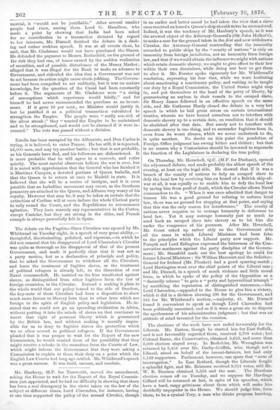Mr. Hanbury, M.P. for Tamworth, moved the amendment, asking the
House to wait for the Report of the Royal Commis- sion just appointed, and he had no difficulty in showing that there has been a real divergency in the views taken on the law of the subject at different times, Lord Clarendon, for instance, having at one time supported the policy of the second Circular, though in an earlier and better mood he had taken the view that a slave once received on board a Queen's ship should never be surrendered. Indeed, it was the tendency of Mr. Hanbury's speech, as it was the avowed object of the Attorney-General's (Sir John Elolker's), to make a case for the ground taken in the first and now withdrawn Circular, the Attorney-General contending that the immunity accorded to public ships by the " comity of nations" is only an immunity from foreign jurisdiction, not an immunity from foreign law, and that if we would obtain the influence we might with nations which retain domestic slavery, we ought to give effect to their law within their own dominions, while doing our best to get them to alter it. Mr. Forster spoke vigorously for Mr. Whitbread's resolution, expressing his fear that, while we were hesitating about sanctioning a reactionary policy, and waiting to be taught our duty by a Royal Commission, the United States might step in, and put themselves at the head of the party of liberty, by guaranteeing an asylum in their vessels to the escaped slave. Sir Henry James followed in an effective speech on the same side, and Mr. Gathorne Hardy closed the debate in a very hot speech in which he laid great stress on certain international treaties, wherein we have bound ourselves not to interfere with domestic slavery up to a certain date, on condition that it should be abolished after that date. But surely not to interfere with domestic slavery is one thing, and to surrender fugitives from it, even from its worst abuses, which we never undertook to do, is quite another. No doubt on this point the pendulum of Foreign-Office judgment has swung hither and thither ; but that is no reason why a Commission should be invented to supersede the function of the Legislature in declaring the true policy.


































 Previous page
Previous page